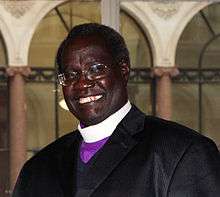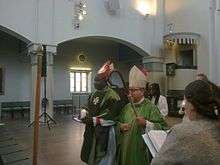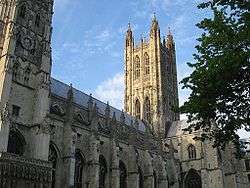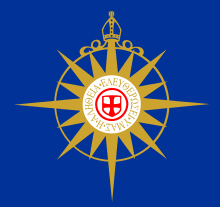Province of the Episcopal Church of South Sudan and Sudan
| Province of the Episcopal Church of South Sudan and Sudan | |
|---|---|
| Primate | Daniel Deng Bul |
| Headquarters | Juba, South Sudan |
| Territory | South Sudan, Sudan |
| Members | 4.5 million |
| Website |
sudan |
The Province of the Episcopal Church of South Sudan and Sudan, formerly known as Episcopal Church of Sudan, is a province of the Anglican Communion located in South Sudan and Sudan. The province consists of 41 dioceses, each headed by a bishop. The current archbishop and primate is the Most Rev. Daniel Deng Bul.
Archbishop

The episcopal see of the Archbishop of South Sudan and Sudan is at Juba. The incumbent serves the church as both its Primate and its Metropolitan archbishop and is titled "Archbishop of South Sudan and Sudan, and Bishop of Juba". He represents the province to the rest of the Anglican Communion, and serves on the international Primates' Meeting. In February 2008, the Episcopal Church of Sudan elected Bishop Daniel Deng Bul of the Diocese of Renk to serve as its next archbishop, succeeding Archbishop Joseph Marona, who retired on 31 December 2007 after serving seven years in the office.[1]
History
The first major Anglican mission in Sudan was founded in Omdurman in 1899, under the auspices of the Church Mission Society. The mission led to widespread conversion to Christianity throughout southern Sudan. Missionary activity came first under the Diocese in Jerusalem, and then, in 1920, as part of the new Diocese of Egypt and the Sudan, with Llewellyn Henry Gwynne as its first bishop. As the pace of growth continued, a separate Diocese of the Sudan was formed with its own bishop in 1945. In 1957, oversight for the Diocese of the Sudan was transferred from the Archbishop of Canterbury to the Archbishop in Jerusalem. In 1974, when the Episcopal Church in Jerusalem and the Middle East underwent structural reform, Sudan became an independent province of four dioceses.
Due to continued growth and displacement due to the Second Sudanese Civil War, the province had 11 dioceses in 1993 and has currently 41. Most of the dioceses are small and clustered in the south. The Episcopal Church of Sudan has played a prominent role in the peace process in Sudan. With the secession of South Sudan, in 2011, it has 5 large dioceses covering Sudan (Khartoum, Port Sudan, El Obeid, Wad Medani and Kdugli), and 26 dioceses at South Sudan. With an estimated number of four and a half million members, the Episcopal Church of the Sudan accounts for almost half of South Sudan population.

The Episcopal Church of Sudan decided to rename itself as Province of the Episcopal Church of South Sudan and Sudan at the meeting that took place in Bor, South Sudan, from 27 to 30 November 2013.
Creation of new Province
At the November 2013 Synod it was resolved to create an internal (or metropolitical) Province comprising the dioceses of Sudan, but to maintain the overall unity of the church across Sudan and South Sudan.[2] The Internal Province of the Episcopal Church of Sudan was created, comprising the 5 dioceses situated in Northern Sudan, of which Ezekiel Kondo, the Bishop of Khartoum, was elected the first Archbishop on 4 April 2014.[3]
Many in Sudan maintained a longer term view of separating this internal province from South Sudan to full autonomy, with the expectation that the metropolitan archbishop would ultimately become archbishop primate of the new autonomous church. In 2016 a formal application was made to the Anglican Consultative Council (ACC) for the internal province of Sudan to be granted autonomy, and in July 2016 a team led by the Archbishop of Adelaide and the Vice Chairman of the ACC carried out a fact-finding mission in northern Sudan. This team will report back to the ACC who will decide on the formal response to the application for autonomy.[4]
Membership
There are approximately 4,500,000 Episcopalians in the province, mostly in South Sudan, with a small number also in Sudan.
Archbishops
There have been four Archbishops and Primates of the Episcopal Church of Sudan, currently named Province of the Episcopal Church of South Sudan and Sudan, since his creation in 1976.[5]
Archbishops (Primate)
- Elinana J. Ngalamu, 1976–1988
- Benjamin Wani Yugusuk, 1988–1998
- Joseph Marona, 2000–2007
- Daniel Deng Bul, 2008–present
Archbishops (internal province)
- Ezekiel Kondo, 2014–present
Dioceses
The Episcopal Church of South Sudan and Sudan has 41 dioceses.[6]
- Akot
- Attooch
- Aweil
- Awerial
- Bor
- Cueibet
- Duk
- El-Obeid
- Ezo
- Ibba
- Juba
- Kadugli and Nuba Mountains
- Kajo Keji
- Khartoum
- Kongor
- Lainya
- Lomega
- Lui
- Malakal
- Malek
- Malek Rup
- Maridi
- Mundri
- Nzara
- Olo
- Pacong
- Port Sudan
- Rejaf
- Renk
- Rokon
- Rumbek
- Terekeka
- Torit
- Twik East
- Wad Medeni
- Wau
- Wondurba
- Yambio
- Yei
- Yeri
- Yirol
Anglican realignment
The Episcopal Church of Sudan is a member of the Global South and of the Fellowship of Confessing Anglicans, and as such has been involved in the Anglican realignment movement. The House of Bishops of the Episcopal Church of Sudan decided to break communion with the Episcopal Church from the United States, because of their acceptance of non-celibate homosexuality, at their General Synod, held in 14–16 November 2011, declaring itself at the same time in full communion with the Anglican Church in North America.[7][8] It was decided still to "work with those parishes and dioceses in TEC who are Evangelical orthodox churches and faithful to God". Archbishop Robert Duncan of the ACNA spent the three days of Easter, at 19–21 March 2013, in the province, at invitation of Archbishop Daniel Deng of the Episcopal Church of Sudan.[9] Ezekiel Kondo, of the Internal Province of Sudan, was one of the eight Anglican archbishops that attended Foley Beach enthronement which took place on 9 October 2014, at the Church of the Apostles, in Atlanta, United States.[10] The House of Bishops decided to formally recognize and to forge a closer relationship with ACNA, following their meeting, held in 25–28 November 2015. At the same time, it was decided to end any formal ties with the Episcopal Church, due to their resolutions that redifined marriage and are not in conformity with the Scriptures, in their view. The House of Bishops also recommended that their Provincial Synod severed any relationship with other province of diocese that approves the blessing of same-sex unions, like the Anglican Church of Canada and the Anglican Episcopal Church of Brazil. They also encouraged all the South Sudanese and Sudanese "diaspora congregations" in the United States to join, wherever possible, ACNA.[11]
See also
 Anglicanism portal
Anglicanism portal
References
- ↑ Anglican Communion News Service: The Episcopal Church of Sudan elects Bishop Daniel Deng Bul as Primate
- ↑ "Sudan synod rejects call to divide: The Church of England Newspaper, December 13, 2013". Conger. Retrieved 5 March 2015.
- ↑ "An Archbishop for Northern Sudan". Retrieved 5 March 2015.
- ↑ Report on visiting team at ACNS.
- ↑ Fr Daniele. "THE EPISCOPAL CHURCH OF SUDAN IN THE HISTORY OF DIVIDED SUDAN". Retrieved 5 March 2015.
- ↑ List of the Dioceses of the Province of the Episcopal Church of South Sudan and Sudan at the Anglican Communion Official Website
- ↑ Sudan breaks with the Episcopal Church, Anglican Mainstream, 27 December 2011
- ↑ "Anglican Church in North America". Retrieved 5 March 2015.
- ↑ "Anglican Church in North America". Retrieved 5 March 2015.
- ↑ "ATLANTA: 2000 Anglicans Participate in Historic Investiture of New Anglican Archbishop - Virtueonline – The Voice for Global Orthodox Anglicanism". Retrieved 5 March 2015.
- ↑ Anglican Church of South Sudan and the Sudan Recognizes the Anglican Church in North America, ACNA Official Website
External links
- Episcopal Church of Sudan Official Website
- Province of the Episcopal Church of South Sudan and Sudan Official Website (In Construction)
- Province of the Episcopal Church of South Sudan and Sudan at the Anglican Communion Website
- AFRECS: American Friends of the Episcopal Church of Sudan
- Kitap De Duɔr Prayer Book with Hymns, in Dinka, Bor dialect (1956) digitized by Richard Mammana in 2015
